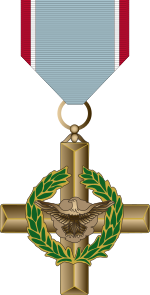Origins
Originally entitled the "Distinguished Service Cross (Air Force)", [8] the Air Force Cross was first proposed in 1947 after the creation of the United States Air Force in September that year as an independent armed service. The medal was designed by Eleanor Cox, an employee of the Air Force, and was sculpted by Thomas Hudson Jones of the U.S. Army Institute of Heraldry.
The Air Force Cross was established by Public Law (PL) 86-593 [9] on 6 July 1960 and made effective through an amendment to Title 10 USC, Section 8742; [1] July 6, 1960, by PL 86–593 in Chapter 857, Sections 8742, 8744 and 8745 of Title 10, USC to substitute "Air Force cross" for "Distinguished-service cross" and inserted "Air Force cross" in Sections 8748 and 8749. [10] [11] Prior to July 6, 1960, United States Air Force airmen were awarded the Distinguished Service Cross. [1]
Additional awards of the Air Force Cross are annotated by oak leaf clusters. [12]
Criteria for award
Title 10, Chapter 857, Section 8742. Air Force Cross: Award
The President may award an Air Force cross of appropriate design, with ribbons and appurtenances, to a person who, while serving in any capacity with the Air Force or Space Force, distinguishes themselves by extraordinary heroism not justifying the award of a Medal of Honor: [13]
- while engaged in an action against an enemy of the United States;
- while engaged in military operations involving conflict with an opposing foreign force; or
- while serving with friendly foreign forces engaged in an armed conflict against an opposing armed force in which the United States is not a belligerent party. [13] [14]
The medal is usually presented by the Secretary of the Air Force in a formal ceremony at the Pentagon. [1]
Description
The medal consists of a bronze cross with an oxidized satin finish. Centered on the cross is a gold-plated American bald eagle, wings displayed against a cloud formation (from the crest of the Department of the Air Force Seal) [1] [15] encircled by a laurel wreath finished in green enamel. The reverse side of the medal is blank and may be engraved in capital letters with the recipient's rank (abbreviated), first name, middle initial, last name and branch of service. [11]
The ribbon (and service ribbon) is brittany blue, edged with red, and bears a narrow white vertical stripe inside the red edges. The ribbon is almost identical to that of the Army's Distinguished Service Cross, except for the lighter blue center stripe, indicating the close connection of these awards. [11]
Awards
The first award of the Air Force Cross was made posthumously to Air Force Major Rudolf Anderson, a U-2 pilot, for extraordinary heroism during the Cuban Missile Crisis in 1962. [11]
As of October 2017 there had been 202 awards of the Air Force Cross to 197 individuals. Three were retroactively awarded for actions in World War II. [16] One hundred eighty were awarded for heroism in the Vietnam War, [17] and four for heroism during the 1975 Mayagüez Incident immediately following (these are sometimes counted with the Vietnam War awards). [18] Two were awarded for the 1991 Gulf War; one, to USAF Pararescueman Timothy Wilkinson, for the 1993 Battle of Mogadishu in Somalia, and three were awarded for heroism during Operation Anaconda in Afghanistan in 2002, two to USAF Pararescuemen Keary Miller and Jason Cunningham and one to special tactics Technical Sergeant John Chapman, a combat controller. One was awarded to combat controller Zachary Rhyner for actions in the Shok Valley, Afghanistan on April 6, 2008. [19] Another was awarded to USAF Pararescueman MSgt Ivan Ruiz for heroism in Kandahar Province, Afghanistan, Dec. 10, 2013. [20]
On October 17, 2017, the Air Force Cross was awarded to Staff Sergeant Richard Hunter, for actions against the Taliban in Kunduz province Afghanistan on November 2, 2016. [21]
On April 20, 2017, SSgt Chris Baradat was presented with the Air Force Cross for his actions in the Sono Valley, Kunar province, on April 6, 2013, while serving as a QRF Combat Controller with the 21st Expeditionary Special Tactics Squadron. [22]
On September 21, 2020, a combat controller, not named, was awarded the Air Force Cross, for actions during the Battle of Khasham. [23]
Fifty awards have been posthumous, including 30 to members missing in action. Twenty-four have been awarded to enlisted personnel, including 12 Pararescuemen. Seventeen graduates of the United States Air Force Academy have been presented the award, and 13 were awarded for conduct while a prisoner of war.
There have been five multiple recipients:
This page is based on this
Wikipedia article Text is available under the
CC BY-SA 4.0 license; additional terms may apply.
Images, videos and audio are available under their respective licenses.


